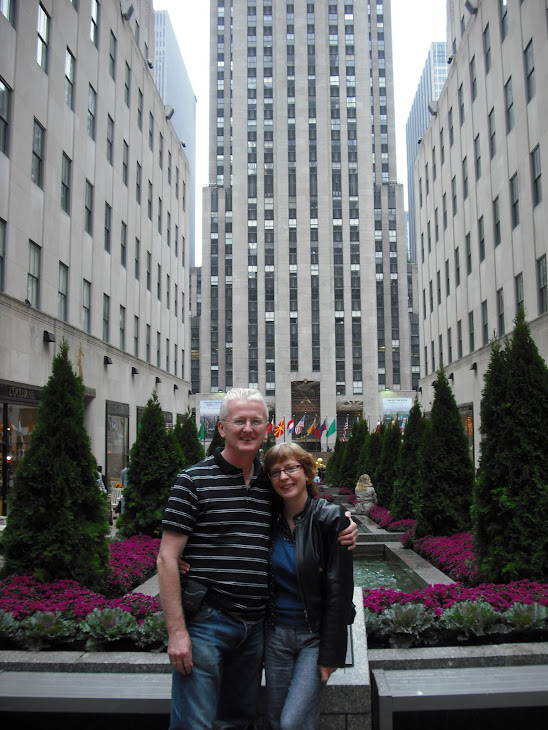There have been a
number of small changes in Roch’s condition. Taken together, they bring him
closer to the state of helplessness which he dreads. Every day on the internet
I see the courage and hope of people living with MND. I see how Carers and
families strive to be positive.
I think “I used to be like that.” I don’t wish
to discourage but I truly believe that the farther into the hell of this
illness you get, whether Carer or Sufferer (and I use that word deliberately)
the more difficult it is to be positive and upbeat about it. Roch lives with
MND but as the disease progresses, let’s not sugar coat it, he suffers. As a
Carer I also feel that there are times when it’s ok to sit with sadness and
grief and to face the fact that the Monkey kills. In my very first blog post, written on 24th
March 2010 I wrote:
“Ok so now I've
started. I'm a blogger! I've decided to blog about my life, specifically since
my husband was diagnosed with MND last June. For those of you who don't know,
MND stands for Motor Neurone Disease. It's a progressive degenerative neurological
condition (what a mouthful) and at present he is 'living with it' but we all
know it'll get him in the end. He calls it 'The monkey on his back'.”
“We all know it’ll get him in the end.”
Of course, if you
stayed in a mindset of sadness and grief, you wouldn’t be able to function, but
it’s important to give yourself permission to feel sad and face the truth of it
and not to feel guilty if you can’t feel positive and upbeat all the time. I’ve
been at Carers meetings in the past where I’ve felt something of a fraud, with
Roch relatively well and functioning. I’ve listened to family members who have
broken down, speaking of their loved one’s suffering and how they are watching
the rapid degeneration of that person’s body. They’ve spoken not just of their
grief, but of their fear and feelings of helplessness. For them it was a case
of trying to deal, not just with the practical problems presented by the rapid
onset of symptoms, but with the overwhelming emotions which accompanied these
changes. I recognise that we’ve been luckier than that. We have faced a slower
progression and have been granted the time to plan ahead, organise strategies –
prepare…
Now, as I say, there
have been a number of changes. You know his breathing has been compromised for
some time – the use of an inhaler and increased use of his ventilator helps
this, but he gets very breathless at times, especially when eating. As he says
himself, breathing and eating at the same time is a major undertaking. Thank
goodness for the PEG. But he still wants to eat and why not, if we can manage
it? Now the swallowing is becoming an issue. It’s what I’ve been dreading. The speech
therapist, Cate, came to visit last week. It was a very positive meeting and Cate
could not have been more pleasant or sympathetic. All her advice was very
helpful. And yet I sat there fighting the strongest urge to get up and run
away. The words ‘I don’t want to be here’ scrawled themselves across the inside
of my brain and with an effort, I erased them, bringing myself back to the
practicalities of the moment.
I’ve been there
before – anyone who thinks I take it all in my stride is mistaken. I have to carefully
process each change. What exactly does this change mean? What can I expect?
What is required of me? What must I do/obtain/learn to deal with it? What will help me to cope with this? Eventually,
I settle down to the ‘new normal’ and hope that nothing else changes too soon.
I’m aware that this post
may sound negative but I make no apologies for this. Instead, I offer you my
thoughts on answering the question I pose above, a question every Carer must
ask themselves:
“What will help me to
cope with this?”
I know I’ve mentioned
living in the moment before but now I’m going to talk about it again because I
believe this is the key to survival for me, as the Monkey gains in strength and
momentum.
You know that I have
tried to meditate. I’ve told you that I’m not very good at it and that my counsellor
feels it would help. I know that she’s right and every so often I try again. So
the other day I signed up for a free 21 day meditation package with Deepak
Chopra. Sometimes things just seem to fit together. Call it Karma. This morning
I listened to Deepak’s guidance for the Day’s meditation and it spoke to me as
the Carer of a Person with MND. I remembered a previous blog post about living in
the moment. Deepak spoke of ‘The Wisdom of Uncertainty’.
“Openness is Here and
Now,” he tells us. “We are not facing the Unknown as something to fear. The present moment is eternal,” he says,
“Because it endlessly renews itself. What is the next thing that will bring you
joy? You don’t know. It’s unpredictable. The next thing you see may be a source
of innocent joy. This is the Wisdom of Uncertainty.”
The Wisdom of
Uncertainty. We know that the path of every person living with MND, every
person who feels they are suffering through MND is uncertain. But by living in the moment, fully
experiencing the small and unexpected joys and beauties of this life as they
happen, as Carers we can embrace that uncertainty and not worry about the
future. Yes, we all know it will get him in the end but we don’t know exactly
how that will happen. I don’t have to
face that now. Everything else but the present moment is uncertain.
Likewise, it occurs
to me that if the present moment is a moment of fear, of panic, of grief, of
sadness, I can know that this moment, too, will pass. “The present moment is
eternal because it endlessly renews itself.”
Of course, there can
be other certainties. Here is the rest of the blogpost I wrote on 24th
March 2010:
“If anyone ever asks
me 'Which living person do you most admire?' I will tell them 'My husband,
Roch.' He knows this. I've told him. He is the bravest person I know.”
Go on, ask me again. The
answer remains the same.

